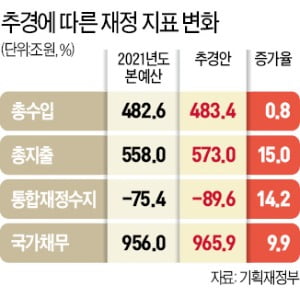A red light lit up in fiscal soundness as the government decided to issue a deficit government bond worth 10 trillion won in order to pay the 4th disaster support fund. It is necessary to respond to the novel coronavirus infection (Corona 19), but as the scale grows ahead of the April election, the national debt and debt ratio are deteriorating. There are also concerns that the debt will exceed 1,000 trillion won by the end of this year if the 5th to 6th subsidies, including national condolence money, are given in the future.
○ The worst fiscal deficit

Out of the 4th disaster subsidy amounting to KRW 1.95 trillion, which was decided by the government at the Cabinet meeting on the 2nd, the additional correction budget is KRW 15 trillion. 4.5 trillion won will be covered by the existing budget. This addition is the third largest in history, following the third supplementary supplement for responding to Corona 19 last year (2.3 trillion won) and the global financial crisis in 2009 (1.7 trillion won).
The government decided to cover 9.9 trillion won out of an additional 15 trillion won by issuing deficit government bonds. Accordingly, this year’s national debt will increase by 119 trillion won from the end of last year to reach 95.9 trillion won. The ratio of national debt to gross domestic product (GDP) rises by 1 percentage point from 47.3% to 48.2%.
The size of the deficit is also expected to increase significantly. Due to this addition, the managed fiscal balance excluding the social fund balance from the integrated fiscal balance is expected to record a deficit of 126 trillion won. From last year’s 111.6 trillion won deficit, it will increase by 7.40 trillion won. The government predicted that the ratio of the deficit to GDP would be -6.1% to -6.3%, the worst ever recorded.
○ Narat debt could exceed 1,000 trillion won this year
The problem is that the government’s fiscal dispersal will not end here. Political circles, such as the ruling party and the Blue House, are immediately prioritizing the 5th~6th disaster subsidies. It is interpreted as having the presidential election next year in mind. President Moon Jae-in also said last month, “If the situation comes out of the corona, we can review the payment of subsidies to comfort the people and subsidies to fight people’s morale.”
If all these are covered by deficit government bonds, the debt of Narat this year could exceed 1,000 trillion won. This is a calculation taking into account the case in April of last year that spent 14.300 trillion won to provide disaster assistance to the whole people. With the expansion of fiscal dissemination, the ratio of national debt to GDP is also expected to reach 50%.
The government plans to secure the budget first through restructuring of expenditures. And Do-geol, head of the Ministry of Strategy and Finance, said, “It is only in the mid-half that there is room for restructuring of spending for projects with poor execution or poor performance. However, experts consistently point out that spending restructuring is not easier than expected because the budget is settled, and the scale is also insignificant.
Regarding the supplementary draft, Kim Jong-in, chairman of the People’s Forces Emergency Response Committee, pointed out at a meeting of the non-commissioned committee on the morning of that day, “Ahead of the election, we are suddenly discussing the 4th disaster subsidy and announcing that we will pay it urgently.” Ho-young Joo, the head of the same party, said, “There is no answer at all about how to pay off the 1,000 trillion won debt.”
○ Equity controversy also arose
Amidst this, it is also controversial that the government has expanded the target of support to street vendors that are difficult to identify sales and do not pay taxes. In particular, the complaints of self-employed people are great. Self-employed people point out that support for street vendors is unreasonable. Self-employed people will be able to recover subsidies if sales decline is not confirmed, but street vendors who cannot confirm sales themselves cannot take such measures. Some argue that support is not required because they do not pay taxes and there are no fixed costs such as rental fees.
Dissatisfaction has also been filed in the class excluded from subsidies, such as ordinary workers and farmers. It is pointed out that it is not only the street vendors that are struggling with the decrease in income. In a statement on the day, the Korean Federation of Agricultural Managers said, “The government has excluded support for farmers because it is difficult to calculate the amount of income reduction. Likewise, street vendors who cannot clearly know this were included in the support. It will lead to national conflict,” he criticized.
Reporter Kang Jin-kyu [email protected]
